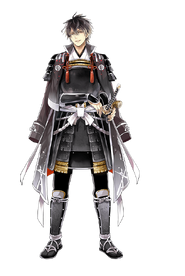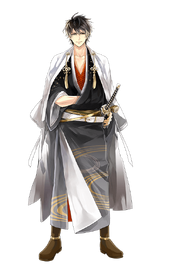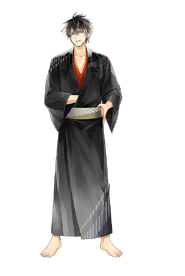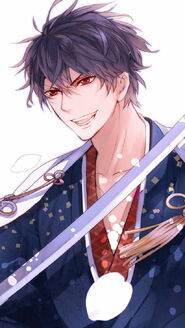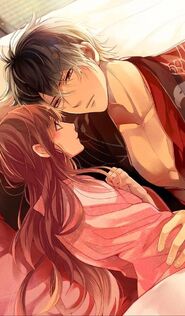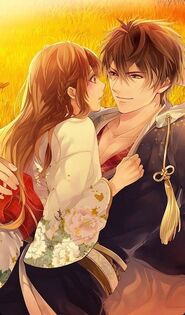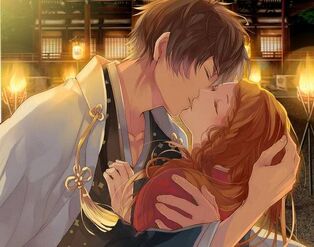"How would you like to rule the world at my side?"
Nobunaga Oda (織田 信長, Oda Nobunaga) is a warlord and a romanceable character in both the Japanese and English versions of Ikémen Sengoku. He is voiced by Tomokazu Sugita.
Appearance
Nobunaga is often seen wearing battle armor with black, gold, and red accents, with a sword and a gun hanging at his side. When relaxing with the heroine, he wears a kimono with similar coloring and a white haori. His sleepwear consists of a black and red yukata. His celebratory outfit, meanwhile, consists of a red kimono with gold, black, and white textiles, and a black haori with gold and white accents. He has black hair with fading grey tips at the end, and carnelian eyes.
Personality
Nobunaga is cold and ruthless on the battlefield, and is willing to kill any opponent in the way of his goal to unite Japan. However, he has shown that he values life. With the heroine, he shows a warmer, gentler side to himself and enjoys teasing her, but ultimately wants her to be happy.
He is also shown to be intelligent, although cocky at times.
Gameplay
Nobunaga is the first warlord the heroine encounters. She is transported back in time through a wormhole to the moment Nobunaga is supposed to be killed, but saves him instead.
If his route is selected, he will be the only roadblock between the heroine and returning to her own time, as he plays "Strip Go" with her in exchange for safe passage to the wormhole that opens in three months. He considers her a good luck charm and constantly drags her to battle in hopes of her bringing him victory just by her presence there.
The heroine, while at first hating the idea of him, eventually expresses a strong desire to understand him.
For maximum love points, Nobunaga's top love choices are the ones in which the heroine defies him, and later on, the ones in which she makes her desire for him clear.
Routes
| Spoiler warning! This section contains plot details about the game. |
Dramatic Route
Nobunaga and the heroine has grown closer and closer through out the route.
The heroine has made her choice of staying in the Sengoku Era to be with Nobunaga. But Sasuke delivers the terrible news that history is trying to fix itself by forcibly bringing them back in their time, and if they do, history will be reverted to the way it was. Nobunaga will supposedly die, and same goes for the people who were suppose to die but were saved.
The heroine tells Nobunaga about the wormhole and escape from it, but nevertheless, the heroine still goes back to the present time, Nobunaga swears that he'll always remember her.
The heroine wakes up in a hospital, not remembering anything that happened the past two months. She has absolutely no memory of Sasuke or anybody before she was sent to the Sengoku Era.
Romantic Route
Eternal Love
Historical
In the late 16th century, Oda Nobunaga was a powerful warlord during the late Sengoku period and is regarded as one of the three unifiers of Japan. Nobunaga was the son of a military governor and is said to have been born in Nagoya Castle. In childhood and in his teen years, he was known for bizarre behavior and was known as the "Big Fool of Owari" by the elders of his province. He was later killed in battle when his retainer Akechi Mitsuhide rebelled against him at Honno-ji.
Gallery
Etymology
- The name Nobunaga means "trust, believe" (信) (nobu) and "long, chief, boss" (長) (naga).
- Nobunaga's surname Oda means "weave, weaving" (織) (o) and "field, rice paddy" (田) (ta/da).
Trivia
- Despite his eyes color being revealed as "carnelian" in Shingen's route, some artworks have his eyes colored in red.
- He's pretty ticklish at his ears.
- Hideyoshi is the love rival in Nobunaga's Route.
- He's a huge fan of sweets.
- The game artists noted that Nobunaga has the armor most similar to that in history, as they wanted to give him a regal appearance.
- If one were to listen closely at his voice clips, Nobunaga refers to the heroine as 'kisama'
- It is an insulting term that depicts inferiority, although Nobunaga uses it in an endearing manner.

